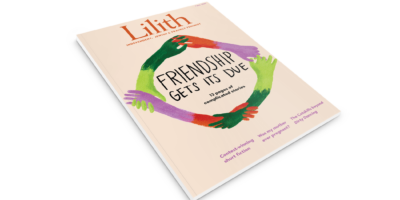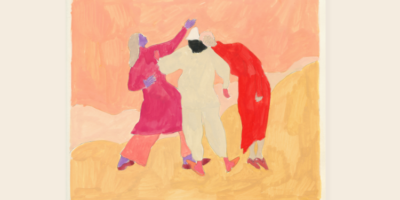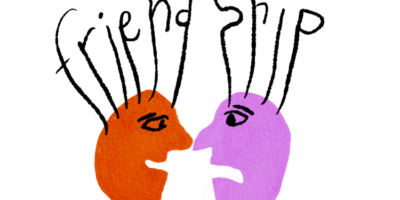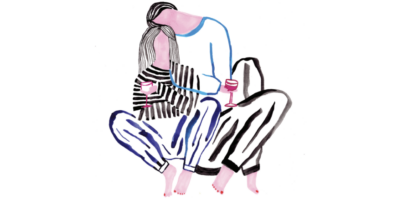
“So, was my mother ever pregnant?”
My cousin looks as if she might hit the floor right in the middle of TGI Friday’s. The poor thing had thought we were having an innocent lunch until I demanded that she spill the family secret.
“Oh, shit. They’re going to kill me!” she splutters.
My stomach flips over. Confirmation. “Nobody’s going to kill you,” I soothe. (Why am I comforting her?) “I already know. I just need someone to confirm that I’m not crazy.”
She sighs in surrender, “You’re not crazy. They’re not actually your parents.”
I almost feel guilty for trapping her. Almost. She is, after all, one of the eight fake family members I grew up with.
The atmosphere in our house was always thick with secrets. My parents insisted on an unlisted phone number. I was switched from one Jewish elementary school to another for no apparent reason. I wasn’t supposed to reveal our vacation destinations. The go-to was radical privacy. And in the way that children do, I normalized it.
As a young adult, I rationalized the borderline paranoia: these were traumatized people. Can you imagine? In 1938, the Anschluss; Austria becomes part of Hitler’s Germany. At 18 and 21, not yet having met, they each escape Vienna just under the wire. Their ordeals continue; hers in the bomb shelters of Blitzkrieg-beleaguered London, and his in perilous British-controlled Palestine. By 1958, incredibly, they had met, married, settled in the Bronx and established a three-family household. His sister’s family upstairs, her parents downstairs. A stable, loving family. Also, a definitive example of collective trauma.
In retrospect, I am empathetic. I do know that my story is not about people purposely making a fool of me; I understand what happens when people operate from a place of fear. They were terrified of so many things, not the least of which was folks finding out that my “adoption” was fraudulent. In addition to the embarrassment and shame of infertility, they had an understandable fear of authority. Hence the falsifications, the lies. It might not have been an actual crime, but they had acquired me through a definitely less-than-legal “arrangement.” Other than my cousin, who didn’t find out until she was
18 and I was 10, everyone in that three-family house—plus several close family friends—were in on the secret that my parents guarded. Virtually everyone around me knew about my false identity—except me.
In my teens, I asked all the obvious questions. I mean, not only was there something really “off” in the house, but I resembled the family less and less each day. I faced a united front; no gaps or discrepancies in the story. My all-important, original birth certificate clearly stated that Yitz and Siddy were indeed my biological parents. True, I was born 200 miles from home, in Boston, but that too had a logical explanation. By the time I was an adult I was mostly numb to the whole business. I had accepted that across-the-board obfuscation was the best I was going to get.
At some point even my own inner voice had begun toeing the party line, “What’s wrong with you?” “Why would you think such a thing?”
My first husband, stating his opinion with complete authority had declared, “Of course you’re not adopted. You have your mother’s legs!” I accepted this, along with “you have your grand- mother’s nose” and “you sing just like your father” because it was easier. Until it wasn’t.
It’s 1988. My friends throw me a baby shower before my third child is born. Naturally, the conversation turns to pregnancy and childbirth. Everyone has her war story. Morning sickness, extended labor, babies born in cars… I cast a sidelong glance at my mom. Who has absolutely nothing to say.
It’s all I can do not to point, and yell “J’accuse!” Instead, the melodrama unfolds exclusively in my head: “That lady has never been pregnant!” It is so clear and I am so certain. But, so what? 21, not yet having met, they each escape Vienna just under the wire. Their ordeals continue; hers in the bomb shelters of Blitz- krieg-beleaguered London, and his in perilous British-controlled Palestine. By 1958, incredibly, they had met, married, settled in the Bronx and established a three-family household. His sister’s family upstairs, her parents downstairs. A stable, loving family. Also, a definitive example of collective trauma.
This is decades before DNA testing for ancestry is available commercially. And I have already learned that no admissions or explanations will be forthcoming from my family.
A year later, I’m sitting at lunch and chatting with my unsuspecting cousin.
“How old were you when you came to the U.S. from Israel?”
“I was 10.”
I couldn’t be more casual. “So, how old was I when you arrived?”
“Oh, you were an infant.” She squirms.
“So…you never did see my mother pregnant?”
“Uuuhh… no. I arrived after you were born.” Full-blown panic has set in. She’s looking around for a reprieve, a distraction, for any help at all.
I plow ahead. “So, was my mother ever pregnant?”
By the time I get home, the phone is ringing. My dad announces heartily, “I understand we need to talk.” As if there’s good news to share. As if we should get together and discuss the lovely weather. His heavily accented English sounds more alien to me than usual. It’s a bit jarring to realize just how dis- connected I feel from this nice couple that raised me. I head up to their condo, braced for confrontation. They launch into the rehearsed narrative, the truth-telling they’ve been dreading for more than 30 years.
Bella Bogart, one of Lilith’s New 40 cohort of emerging writers, is a (mostly) retired rabbi. She writes about growing up in the shadow of the “family secret” and, at age 60, finally discovering her biological origins.






